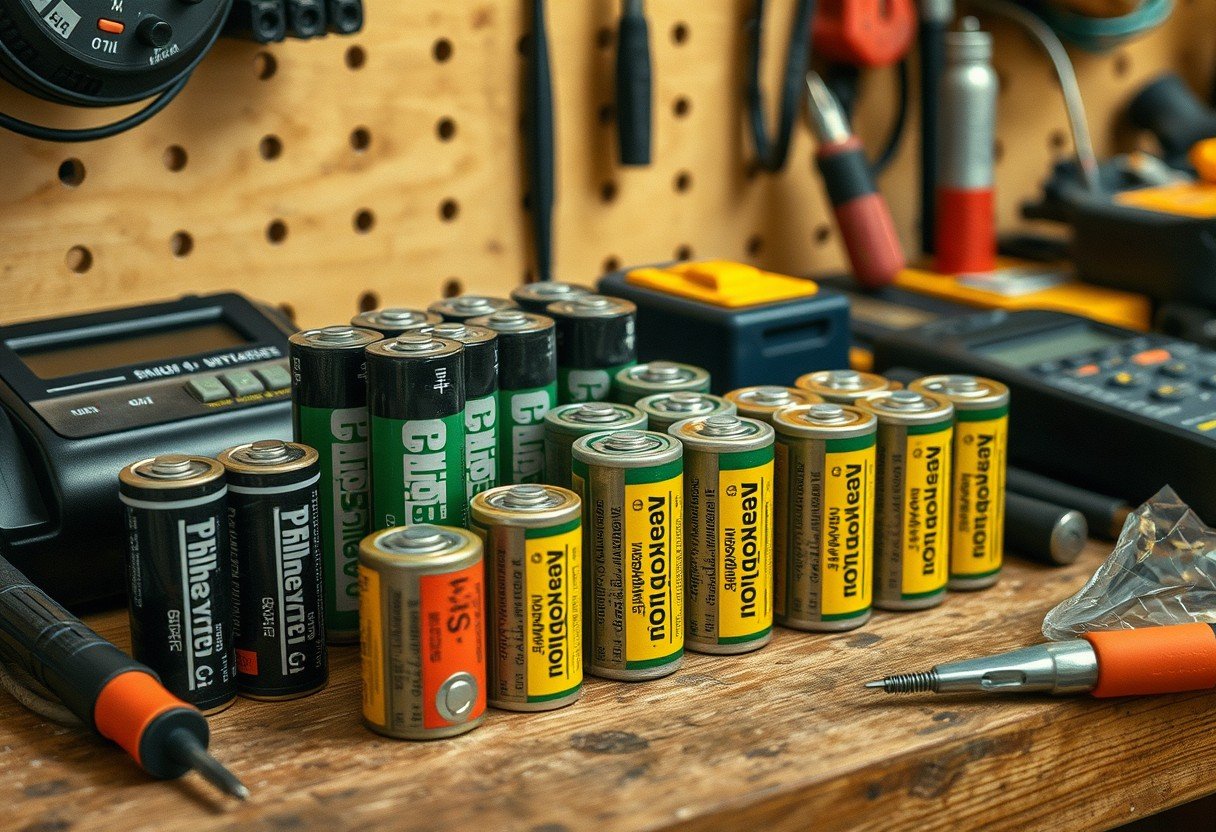Why and when to replace 9 volt batteries
Knowing when to replace a 9 volt battery keeps alarms, meters, toys, and tools working when you need them. It matters in every home and workplace, from bedrooms with smoke alarms to garages with testers. Learn what to check, how to test, and the best schedule to follow so you avoid surprise failures.
The goal is simple: replace before failure, not after.
9 volt basics and battery types that fit different devices
Most 9 volt batteries are used in low drain devices like smoke alarms, multimeters, wireless mics, and small radios. Capacity, shelf life, and cold or heat performance change with chemistry.
Pick the chemistry that matches your device use, not just the lowest price.
| Battery type | Typical shelf life | Typical use life in low drain | Best for |
|---|---|---|---|
| Alkaline 9 volt | 5 to 7 years | 6 to 12 months in smoke alarms | Everyday devices, budget choice |
| Lithium 9 volt | 8 to 10 years | Up to 2 to 5 years in some devices | Long shelf life, cold or hot climates |
| NiMH rechargeable 8.4 V or 9.6 V | 2 to 4 years (cycle based) | 300 to 500 charge cycles | Frequent use, gear you recharge often |
NiCd 9 volt batteries are older and less common due to cadmium rules. Many NiMH 9 volt packs are 8.4 V nominal, which can sit lower under load, so check your device manual before use.
Clear signs your 9 volt battery needs to be replaced
Devices start to act odd before they die. Early warning signs save time and money.
If your alarm chirps, display dims, audio distorts, or startup lags, replace the battery now.
Watch for repeated false alarms in smoke alarms, intermittent power in test tools, slower shutter in wireless triggers, and toys that run weakly. If a device eats batteries faster than usual, the battery may be weak or the device may have a fault.
Also inspect the battery: any swelling, leak, rust on terminals, or heat during use means remove and recycle it safely.
How to test a 9 volt battery with a multimeter
Testing takes one minute and tells you if the battery can still do the job.
- Set your multimeter to DC volts and touch red to the small positive terminal and black to the large negative terminal.
- Read the open circuit voltage and compare to the table below. For best accuracy, test under a small load if your meter or tester supports it.
- If the reading is weak or unstable, replace the battery, especially in safety devices.
Most fresh alkaline 9 volt batteries measure around 9.2 to 9.6 volts with no load.
| Meter reading | Condition | Action |
|---|---|---|
| 9.2 to 9.6 V | Fresh | Okay for any device |
| 8.5 to 9.1 V | Good | Use in non critical gear |
| 7.5 to 8.4 V | Weak | Replace soon, not for alarms |
| Below 7.5 V | Failing | Replace now |
Some devices have higher cutoffs and will chirp even above 8 volts. Always follow the device manual for the most accurate threshold.
Lifespan and replacement timing you can trust
Battery life depends on device draw, storage temperature, and battery age. A smoke alarm draws a tiny current, but it must always be ready.
For replaceable battery smoke alarms, change the 9 volt at least once per year and test the alarm each month.
NFPA guidance says replace the entire smoke alarm unit every 10 years. Sealed 10 year alarms do not take a user replaced battery, so replace the alarm when it chirps end of life. In tools, mics, and meters, change the battery at the first sign of instability to avoid downtime.
Store spares in a cool, dry place. High heat speeds up self discharge and can cut shelf life in half.
Best practice for smoke and carbon monoxide alarms
Safety devices deserve extra care. A weak battery can cost you precious seconds in an emergency.
- Press the test button monthly and listen for a strong, steady tone.
- Replace the 9 volt battery every year or at the first chirp, whichever comes first.
- Write the install date on the battery so you know its age at a glance.
If your alarm chirps after a new battery, hold the test button for 15 seconds to reset, then check the manual.
Do not use rechargeable 9 volt batteries in alarms unless the maker says it is allowed. Many alarms are designed only for alkaline or lithium primary 9 volt batteries.
Storage, maintenance, and small habits that extend battery life
A few simple habits add months of reliable service and reduce waste.
- Keep batteries in original packs or cover terminals with caps to prevent shorting.
- Avoid extreme cold or hot spots like cars, attics, and windowsills.
- Remove batteries from gear you store for more than 30 days to prevent leaks.
Never carry loose 9 volt batteries in a pocket or toolbox with metal parts, as the terminals can short.
Clean device contacts with a dry cotton swab if you see green or white residue. If a battery leaks, wear gloves, wipe up with baking soda for alkaline, and replace the device if damage is severe.
Safe disposal and easy recycling options
Do not toss used 9 volt batteries into drawers or trash without covering the terminals. A coin or foil can bridge the two posts and start a fire.
Tape both terminals with clear tape and take old batteries to a battery collection bin or household hazardous waste site.
In many places, alkaline batteries can go in regular trash, but recycling is still better for the environment. Rechargeable and lithium 9 volt batteries should always be recycled at a certified drop off location.
Quick troubleshooting checklist before you blame the battery
Sometimes the device causes the issue, not the battery. A short check saves you a trip to the store.
- Confirm polarity and that the snap connector is tight and not cracked.
- Try a known good battery to rule out device faults.
- Check for corrosion on springs or clips and clean gently if needed.
If the device still fails with a fresh battery, it likely needs repair or replacement.
FAQ
How often should I replace a 9 volt battery in a smoke alarm
Replace it once a year or at the first low battery chirp. Test the alarm monthly and replace the whole alarm every 10 years.
What voltage should a good 9 volt battery read on a multimeter
A fresh alkaline usually reads 9.2 to 9.6 volts with no load. Below about 7.5 volts is weak in most cases and should be replaced.
Can I use a lithium 9 volt in my smoke alarm
Yes, many alarms allow lithium 9 volt batteries and they last longer in extreme temperatures. Always check the alarm label or manual first.
Why does my alarm chirp even after I put in a new battery
The alarm may need a reset or the connector may be loose. Hold the test button for 15 seconds, reseat the snap, and confirm the battery is fresh.
Are rechargeable 9 volt batteries good for safety devices
Most makers do not recommend rechargeables for smoke or carbon monoxide alarms. Use alkaline or lithium primary unless the manual clearly says rechargeables are approved.
What is the best way to store spare 9 volt batteries
Keep them in a cool, dry cabinet in original packaging with terminals covered. Avoid fridges, hot garages, and contact with metal objects.





Leave a Comment